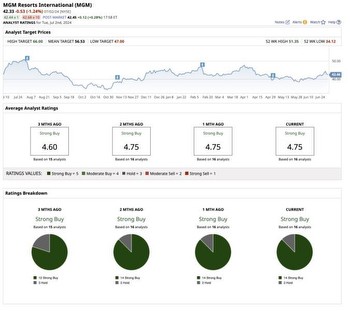Better Buy: Wynn Resorts or Las Vegas Sands Stock?

The gaming and resort industry continues to recover from the pandemic, and one of the biggest gaming markets in the world reopened earlier this year: Macao, China. With Macao back in action, casino operators there stand to benefit from pent-up demand -- as do casino stock investors.
Here, I'll compare two American casino companies with properties in Macao and decide which is a better buy.
The case for Wynn Resorts
After posting record-high earnings for its Las Vegas resort last quarter, Wynn Resorts(WYNN -0.37%) aims to carry its current momentum through 2023 and beyond.
The Wynn Las Vegas resort generated revenue last quarter that surpassed the company's own expectations, marking an 18% improvement over the same period in 2021. During Wynn's fourth-quarter earnings call last month, Chief Financial Officer Julie Cameron-Doe explained how non-gaming offerings such as food and beverage, entertainment, and retail contributed to "broad-based strength" in Vegas.
For the year, Wynn Las Vegas delivered $801 million on the basis of earnings before interest, taxes, depreciation, amortization, and restructuring or rent costs (EBITDAR). Regarding Wynn Las Vegas' full-year 2022 normalized adjusted property earnings of $816 million, CEO Craig Billings boasted: "I'm confident that this is an all-time record for a stand-alone Las Vegas Strip property."
Although Wynn was profitable in Q4, it posted a net loss of $424 million for 2022 overall. Operating expenses related to rooms, food and beverage, and property maintenance rose substantially compared to 2021.
Since COVID-19 restrictions in Macao were lifted in early January, operations there saw a dramatic upswing in business. In fact, during the Lunar New Year period starting in January, Wynn's Macao properties enjoyed their best EBITDAR performance since the onset of the pandemic.
With current reservations rivaling pre-pandemic levels, Wynn's "forward-looking indicators also remain quite strong despite well-known macro concerns," Billings said.
The case for Las Vegas Sands
After posting record-high Q4 revenue at its Marina Bay Sands resort in Singapore, Las Vegas Sands(LVS 0.40%) now looks forward to a bright future in Macao.
As Chief Operating Officer Patrick Dumont described it, "There was this pent-up demand story in Singapore and now it's blossomed into full-on bonanza." And every segment of Marina Bay Sands is working, with record levels of performance achieved in mass gaming and retail, according to CEO Robert Goldstein.
Q4 net revenue finished at $1.12 billion, marking an 11% year-over-year improvement. But despite higher revenue, Las Vegas Sands actually ended the quarter with a net loss of $169 million, larger than Q4 2021's loss of $123 million.
For 2022 overall, Sands came out ahead with a net income of $1.83 billion. However, keep in mind that Sands was only profitable last year because of a $3.6 billion payment from the sale of its Las Vegas properties and operations. Without this large payment, Sands would've ended the year with a $1.77 billion loss.
While Sands' Singapore property thrived last quarter, its five remaining Macao-based resorts were still under strict COVID-19 protocols and therefore unable to function. As a result, Las Vegas Sands endured a 20% higher operating loss last quarter than in 2021, and net loss attributable to the company increased 37% year over year.
Confident in the region's recovery, Goldstein exclaimed that "Macao's future is bright," during the Q4 earnings call. He also referred to Macao as "the largest integrated resort market globally."
Which casino stock is a better buy?
Although Wynn Resorts posted net income in Q4, the company took a net loss for the year. And Las Vegas Sands was only profitable in 2022 due to the sale of its Las Vegas assets. Both companies also earned less revenue in 2022 than in 2021, surprisingly enough.
Therefore, I've compared their price-to-sales ratios (P/S), year-over-year revenue decreases endured in 2022, and how much long-term debt each company has accumulated relative to its debt in 2019 (expressed as a percentage).
Right off the bat, Wynn Resorts' much lower P/S ratio makes it more appealing, as well as the fact that its revenue for 2022 was basically flat versus 2021. Las Vegas Sands, on the other hand, earned nearly 3% less revenue last year compared to 2021. Sands did, however, accrue slightly less debt than Wynn Resorts since 2019.
Regardless of the marginal difference in long-term debt, I call Wynn Resorts the better buy in today's market. I like Wynn because of its balanced portfolio of properties, evenly split between North America and Macao. Las Vegas Sands has all of its proverbial eggs in the same basket, operating solely in Asia.





































